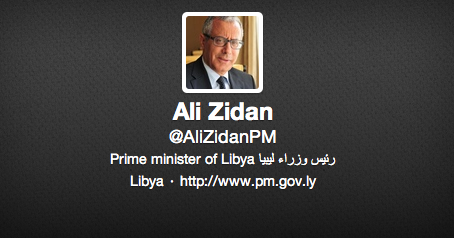By George Grant.

Tripoli, 16 October:
A Twitter account purporting to belong to Prime Minister-elect Ali Zidan has been exposed as a fake . . .[restrict]after a statement from his office today confirmed he does not use the social networking site.
‘@AliZidanPM’ was established just a few hours after Zidan’s election as prime minister on Sunday night, and quickly began making official-sounding declarations and tweeting at Libya’s great-and-the-good.
“Thank you @DrMustafa”, the account tweeted magnanimously, after former prime minister-elect Mustafa Abushagur offered his congratulations to Zidan over Twitter.
Abushagur, it should be said, did not direct his tweet at the new account directly.
The account also tweeted at Asma Magarief, daughter of the National Congress president, declaring that it was “an honour” to have served with her father at the Libyan embassy in India in the late 1970s.
Other pronouncements quickly followed.
“I will be in consultation with all parties and political groups in Libya to form a government of national unity”, said @AliZidanPM shortly after midnight on 15 October.
“The unity of the nation, and the security file will be at the top of the government’s priorities”, he continued, adding that “the health portfolio is no less important”.
In less than 48 hours the account had garnered more than 1,300 followers and become sufficiently well-established to warrant the official intervention.
“IMPORTANT: From the Prime Minister’s press office: Dr Ali Zidan, prime minister-elect, does not have a Twitter or Facebook account”, read an email from a Zidan spokesman today.
“The accounts with similar names have no connection to him. If he does open accounts, it will be announced.”
The identity of the individual behind the fake account remains unknown, but tweets emanating from the source began to take on a less credible hue following the statement.
This afternoon, a raft of policy announcements had emanated from @AliZidanPM, including pledges to increase salaries by at least 25 per cent, pension payments by 10 per cent, and a promise to privatise the Libya Telecom & Technology company. [/restrict]







